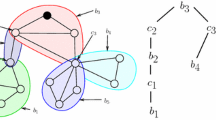Abstract
We consider a communication scheduling problem that arises within wireless sensor networks, where data is accumulated by the sensors and transferred directly to a central base station. One may choose to compress the data collected by a sensor, to decrease the data size for transmission, but the cost of compression must be considered. The goal is to designate a subset of sensors to compress their collected data, and then to determine a data transmission order for all the sensors, such that the total compression cost is minimized subject to a bounded data transmission completion time (a.k.a. makespan). A recent result confirms the NP-hardness for this problem, even in the special case where data compression is free. Here we first design a pseudo-polynomial time exact algorithm, articulated within a dynamic programming scheme. This algorithm also solves a variant with the complementary optimization goal—to minimize the makespan while constraining the total compression cost within a given budget. Our second result consists of a bi-factor \((1 + \epsilon , 2)\)-approximation for the problem, where \((1 + \epsilon )\) refers to the compression cost and 2 refers to the makespan, and a 2-approximation for the variant. Lastly, we apply a sparsing technique to the dynamic programming exact algorithm, to achieve a dual fully polynomial time approximation scheme for the problem and a usual fully polynomial time approximation scheme for the variant.
Similar content being viewed by others
Notes
The NP-hardness result by Berlińska [4], cited in the Preliminaries, hints that deciding whether or not there is a feasible solution to the problem DG-Compr-OptF is NP-complete.
This upper bound of 2T on the makespan holds regardless of existence of a feasible solution to the problem DG-Compr-OptF.
One could probably further reduce the size and/or the dimensionality of the table. We nonetheless use the current table for the ease of presentation.
References
Akyildiz, I.F., Su, W., Sankarasubramaniam, Y., Cayirci, E.: Wireless sensor networks: a survey. Comput. Netw. 38, 393–422 (2002)
Alfieri, A., Bianco, A., Brandimarte, P., Chiasserini, C.F.: Maximizing system lifetime in wireless sensor networks. Eur. J. Oper. Res. 181, 390–402 (2007)
Berlińska, J.: Communication scheduling in data gathering networks with limited memory. Appl. Math. Comput. 235, 530–537 (2014)
Berlińska, J.: Scheduling for data gathering networks with data compression. Eur. J. Oper. Res. 246, 744–749 (2015)
Błażewicz, J., Ecker, K.H., Pesch, E., Schmidt, G., Weglarz, J.: Handbook on Scheduling: From Theory to Applications. Springer, Berlin (2007)
Cheng, J., Ye, Q., Jiang, H., Wang, D., Wang, C.: Stcdg: an efficient data gathering algorithm based on matrix completion for wireless sensor networks. IEEE Trans. Wirel. Commun. 12, 850–861 (2013)
Choi, K., Robertazzi, T.G.: Divisible load scheduling in wireless sensor networks with information utility. In: Proceedings of the 2008 IEEE International Performance, Computing and Communications Conference, pp. 9–17 (2008)
Ergen, S.C., Varaiya, P.: TDMA scheduling algorithms for wireless sensor networks. Wirel. Netw. 16, 985–997 (2010)
Garey, M.R., Johnson, D.S.: Computers and Intractability: A Guide to the Theory of NP-completeness. W. H. Freeman and Company, San Francisco (1979)
Hochbaum, D., Shmoys, D.: Using dual approximation algorithms for scheduling problems: theoretical and practical results. J. ACM 34, 144–162 (1987)
Kellerer, H., Pferschy, U.: Improved dynamic programming in connection with an FPTAS for the knapsack problem. J. Comb. Optim. 8, 5–11 (2004)
Kellerer, H., Pferschy, U., Pisinger, D.: Knapsack Problems. Springer, Berlin (2004)
Kellerer, H., Strusevich, V.: Fast approximation schemes for Boolean programming and scheduling problems related to positive convex half-product. Eur. J. Oper. Res. 228, 24–32 (2013)
Kimura, N., Latifi, S.: A survey on data compression in wireless sensor networks. In: Proceedings of the 2005 International Conference on Information Technology: Coding and Computing, pp. 8–13 (2005)
Kumar, S., Chauhan, S.: A survey on scheduling algorithms for wireless sensor networks. Int. J. Comput. Appl. 20, 7–13 (2011)
Luo, C., Wu, F., Sun, J., Chen, C.W.: Compressive data gathering for large-scale wireless sensor networks. In: Proceedings of the 15th Annual International Conference on Mobile Computing and Networking, pp. 145–156 (2009)
Moges, M., Robertazzi, T.G.: Wireless sensor networks: scheduling for measurement and data reporting. IEEE Trans. Aerosp. Electron. Syst. 42, 327–340 (2006)
Rossi, A., Singh, A., Sevaux, M.: Lifetime maximization in wireless directional sensor network. Eur. J. Oper. Res. 231, 229–241 (2013)
Shi, L., Fapojuwo, A.O.: TDMA scheduling with optimized energy efficiency and minimum delay in clustered wireless sensor networks. IEEE Trans. Mob. Comput. 9, 927–940 (2010)
Tauhidul, I.M.: Approximation Algorithms for Minimum Knapsack Problem. Master’s thesis, University of Lethbridge (2009)
Wang, J., Tang, S., Yin, B., Li, X.Y.: Data gathering in wireless sensor networks through intelligent compressive sensing. In: INFOCOM 2012, pp. 603–611 (2012)
Wu, Y., Li, X.Y., Liu, Y., Lou, W.: Energy-efficient wake-up scheduling for data collection and aggregation. IEEE Trans. Parallel Distrib. Syst. 21, 275–287 (2010)
Xiang, L., Luo, J., Rosenberg, C.: Compressed data aggregation: energy-efficient and high-fidelity data collection. IEEE/ACM Trans. Netw. 21, 1722–1735 (2013)
Xu, L., Wang, Y., Wang, Y.: Major coefficients recovery: a compressed data gathering scheme for wireless sensor network. In: Global Telecommunications Conference (GLOBECOM 2011), pp. 1–5 (2011)
Acknowledgements
W.L. was supported by China Scholarship Council (Grant No. 201408330402), the K. C. Wong Magna Fund in the Ningbo University, and the Ningbo Natural Science Foundation (2016A610078). W.L., Y.X., B.G., R.G. and G.L. were supported by NSERC. W.T. was supported by the FY16 Startup Funding from the Georgia Southern University.
Author information
Authors and Affiliations
Corresponding author
Rights and permissions
About this article
Cite this article
Luo, W., Xu, Y., Gu, B. et al. Algorithms for Communication Scheduling in Data Gathering Network with Data Compression. Algorithmica 80, 3158–3176 (2018). https://doi.org/10.1007/s00453-017-0373-6
Received:
Accepted:
Published:
Issue Date:
DOI: https://doi.org/10.1007/s00453-017-0373-6




